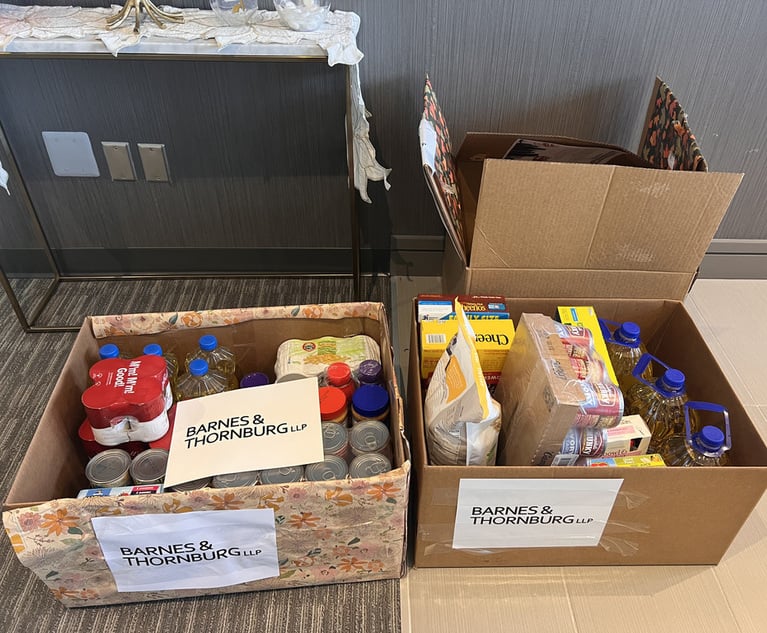 Photo: Wikimedia Commons
Photo: Wikimedia CommonsFirst Two Risperdal Cases Set for Trial on Punitive Damages
Nearly three years after Philadelphia juries awarded compensatory damages in two Risperdal cases, a judge has ordered that the cases proceed to new trials on whether the drugmaker's conduct merits punitive damages.
September 18, 2018 at 02:55 PM
4 minute read
Nearly three years after Philadelphia juries awarded compensatory damages in two Risperdal cases, a judge has ordered that the cases proceed to new trials on whether the drugmaker's conduct merits punitive damages.
Philadelphia Court of Common Pleas Judge Arnold New has denied drugmaker Janssen Pharmaceuticals' efforts to block a punitive damages trial in the cases Stange v. Janssen Pharmaceuticals and Murray v. Janssen Pharmaceuticals. The rulings rejected arguments from the drugmaker that New Jersey law, which does not allow for punitive damages in pharmaceutical cases, applied to the suits.
New denied those requests for summary judgment in separate rulings Sept. 14, and said in both orders that the parties "shall be prepared to discuss the issue of trial scheduling at the next case management conference."
The rulings come about nine months after the state Superior Court reversed New's decision to bar the plaintiffs from seeking punitive damages in any of the Risperdal cases. New had previously ruled that New Jersey law applied universally to the Risperdal mass tort in Philadelphia, which is currently home to nearly 6,700 cases. But, in January, the Superior Court said each plaintiff should be given the opportunity to seek to apply the law of their home state when it comes to the issue of punitive damages.
For plaintiff Timothy Stange, whose case resulted in a $500,000 compensatory award in December 2015, that means Wisconsin law will apply regarding his punitive damages claims, and, for plaintiff Nicholas Murray, that means Maryland law will apply. Murray's case came to a $1.75 million verdict in November 2015, which was later reduced to $680,000.
Kline & Specter attorney Thomas R. Kline, who, along with lawyers from Sheller P.C. and Arnold & Itkin, is a leading attorney in the mass tort program, said New's rulings "have materially advanced the plaintiffs' cause."
"We believe this is a tipping point in this litigation," Kline said. "We have always steadfastly and wholeheartedly believed that this is a punitive damages case and this ruling by Judge New is a welcome pathway forward to the plaintiffs obtaining a full measure of justice."
Janssen spokeswoman Kelsey Buckholtz said in an emailed statement, "We are disappointed in the court's ruling and are continuing to review our options going forward."
So far, of the five Risperdal cases that have come to verdict, all but one resulted in a finding that alleged inadequacies in the drug's warning label caused the plaintiff's injuries. In November, the Superior Court reversed Janssen's sole defense win, and ordered a new trial in that case.
With causation and compensatory damages already having been determined, the punitive damages trials are expected to focus first on whether Janssen's conduct warrants punitive damages, and, if the jury finds it does, what amount should be awarded in punitive damages.
Kline said he plans to be personally involved in at least one of the upcoming punitive damages trials, and his team is likely to call former U.S. Food and Drug Administration head David Kessler to testify. He also said the plaintiffs are likely to point to a document, known as Table 21, which he said shows a significant link between Risperdal and the growth of excess breast tissue in young boys, which is the injury the plaintiffs suffered. That table, plaintiffs contend, was never turned over to the FDA.
"At the heart of this is that Janssen not only knew about the correlation and failed to tell doctors about it, but they did the opposite and reassured physicians and the FDA that it was safe and there was no correlation," Kline said.
Wisconsin law also puts a statutory cap on punitive damages in some cases at $200,000, or twice the amount of compensatory damages. Kline said his team plans to fight the punitive damages cap.
This content has been archived. It is available through our partners, LexisNexis® and Bloomberg Law.
To view this content, please continue to their sites.
Not a Lexis Subscriber?
Subscribe Now
Not a Bloomberg Law Subscriber?
Subscribe Now
NOT FOR REPRINT
© 2024 ALM Global, LLC, All Rights Reserved. Request academic re-use from www.copyright.com. All other uses, submit a request to [email protected]. For more information visit Asset & Logo Licensing.
You Might Like
View All
People in the News—Dec. 17, 2024—Holland & Knight, Marshall Dennehey
4 minute read
Delivery Driver's Slip-and-Fall Suit Slides Forward Against Equipment Rental Company
4 minute read
People in the News—Dec. 16, 2024—Barnes & Thornburg, Rawle & Henderson
3 minute read
3rd Circuit Nominee Mangi Sees 'No Pathway to Confirmation,' Derides 'Organized Smear Campaign'
4 minute readTrending Stories
- 12025 Starting Line-Up: Meet Georgia's Newest Magistrate Court Judges
- 2Delaware Supreme Court Upholds Court of Chancery’s Refusal to Blue Pencil an Unreasonable Covenant Not to Compete
- 3‘It's Your Funeral’: Avoiding Doing Damage to Your Client’s Case With Uncivil Behavior
- 4'Never Been More Dynamic': Big Law Leaders Reflect on 2024 and Expectations Next Year
- 5Pa. 100: Law Schools
Who Got The Work
Michael G. Bongiorno, Andrew Scott Dulberg and Elizabeth E. Driscoll from Wilmer Cutler Pickering Hale and Dorr have stepped in to represent Symbotic Inc., an A.I.-enabled technology platform that focuses on increasing supply chain efficiency, and other defendants in a pending shareholder derivative lawsuit. The case, filed Oct. 2 in Massachusetts District Court by the Brown Law Firm on behalf of Stephen Austen, accuses certain officers and directors of misleading investors in regard to Symbotic's potential for margin growth by failing to disclose that the company was not equipped to timely deploy its systems or manage expenses through project delays. The case, assigned to U.S. District Judge Nathaniel M. Gorton, is 1:24-cv-12522, Austen v. Cohen et al.
Who Got The Work
Edmund Polubinski and Marie Killmond of Davis Polk & Wardwell have entered appearances for data platform software development company MongoDB and other defendants in a pending shareholder derivative lawsuit. The action, filed Oct. 7 in New York Southern District Court by the Brown Law Firm, accuses the company's directors and/or officers of falsely expressing confidence in the company’s restructuring of its sales incentive plan and downplaying the severity of decreases in its upfront commitments. The case is 1:24-cv-07594, Roy v. Ittycheria et al.
Who Got The Work
Amy O. Bruchs and Kurt F. Ellison of Michael Best & Friedrich have entered appearances for Epic Systems Corp. in a pending employment discrimination lawsuit. The suit was filed Sept. 7 in Wisconsin Western District Court by Levine Eisberner LLC and Siri & Glimstad on behalf of a project manager who claims that he was wrongfully terminated after applying for a religious exemption to the defendant's COVID-19 vaccine mandate. The case, assigned to U.S. Magistrate Judge Anita Marie Boor, is 3:24-cv-00630, Secker, Nathan v. Epic Systems Corporation.
Who Got The Work
David X. Sullivan, Thomas J. Finn and Gregory A. Hall from McCarter & English have entered appearances for Sunrun Installation Services in a pending civil rights lawsuit. The complaint was filed Sept. 4 in Connecticut District Court by attorney Robert M. Berke on behalf of former employee George Edward Steins, who was arrested and charged with employing an unregistered home improvement salesperson. The complaint alleges that had Sunrun informed the Connecticut Department of Consumer Protection that the plaintiff's employment had ended in 2017 and that he no longer held Sunrun's home improvement contractor license, he would not have been hit with charges, which were dismissed in May 2024. The case, assigned to U.S. District Judge Jeffrey A. Meyer, is 3:24-cv-01423, Steins v. Sunrun, Inc. et al.
Who Got The Work
Greenberg Traurig shareholder Joshua L. Raskin has entered an appearance for boohoo.com UK Ltd. in a pending patent infringement lawsuit. The suit, filed Sept. 3 in Texas Eastern District Court by Rozier Hardt McDonough on behalf of Alto Dynamics, asserts five patents related to an online shopping platform. The case, assigned to U.S. District Judge Rodney Gilstrap, is 2:24-cv-00719, Alto Dynamics, LLC v. boohoo.com UK Limited.
Featured Firms
Law Offices of Gary Martin Hays & Associates, P.C.
(470) 294-1674
Law Offices of Mark E. Salomone
(857) 444-6468
Smith & Hassler
(713) 739-1250





